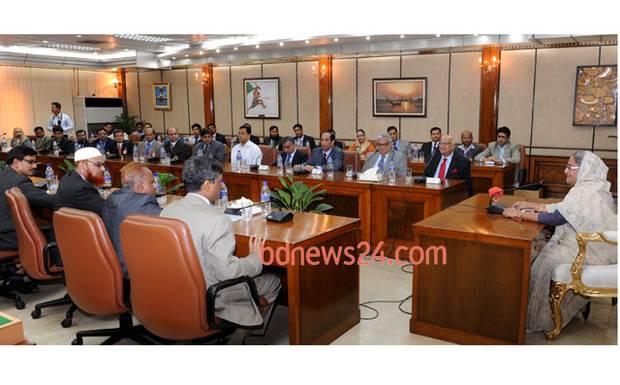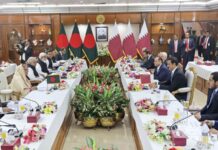Prime Minister Sheikh Hasina has said that upgradation of Bangladesh Securities and Exchange Commission (BSEC) to A-category from B-category by the International Organisation of Securities Commissions (IOSCO) will brighten country’s image and help attract more foreign investments.
“The recognition of IOSCO has paved the way for getting more foreign investment in Bangladesh and has boosted the confidence of the SEC about its functional capability,” the Prime Minister observed when a delegation of BSEC called on her at her office on Wednesday.
Hasina extended her sincere thanks to the SEC commissioners and officials and employees of all levels for their team work and sincere and coherent efforts to achieve the global recognition and for helping it to come out of image crisis over the years.
The IOSCO, an association of organisations that regulates the world’s securities and futures markets, recently upgraded BSEC to A-category, an elite class regulator, from B-category – a feat that is expected to bring some benefits for the country’s securities regulator in the international arena.
The Prime Minister said that Bangladesh would transcend to a middle-income country and become a peaceful, prosperous and developed place to live in by 2031 – 10 years ahead of the projected timeline of 2041.
The Prime Minister said with the implementation of the 10-year Master Plan (2012-2022) undertaken by the SEC, the stock market regulatory body would emerge as a modern, sustainable, stable and time-befitting capital market.
She appreciated the amendments to the Securities and Exchange Commission (Merchant Banker and Portfolio Manager) Rules, which will make it mandatory for the merchant banks to take the commission’s permission to recruit or terminate their managing directors or chief executive officers.
“A gazette notification has been issued authorising that the entrepreneurs and directors of a company enlisted with the SEC jointly can hold at least 30 percent share of the paid-up capital and each of the directors can hold at least 2 percent share,” she said.

She said that the government had formulated and already started the process for implementation of the Exchange Demutualisation Rules saying that “the institutional good governance of the exchanges has been established through this. “The government has separated ownership of the companies from management.”
Hasina said, along with other sectors, her government brought many reforms in the stock market regulations, which were “easy to say but difficult to frame and execute.”
She said, new rules and regulations were enacted for SEC while old ones were reformed. “Steps were taken to ensure accountability of all organisations relating to stock market while the Commission was reconstituted. Apart from this, the SEC has been given economic freedom and power to prepare its own budget,” she said.
She expressed optimism that Bangladesh would be a developed nation by dint of hard labour of the people and country’s geographical location.
She mentioned that the country’s economy has got a strong footing despite the worldwide economic meltdown as the government worked hard and implemented various programmes in a planned manner during the last five years.
International credit rating bodies – Standard & Poor’s (S&P) and Moody’s– have kept Bangladesh’s credit ratings unchanged with a stable outlook for the fourth consecutive years (2010-13).
The Prime Minister further mentioned that Bangladesh could come out of the grey list of Financial Action Task Force (FATF) on Money Laundering due to government’s action against money laundering and terror financing.
“Bangladesh has now emerged as an attractive destination for investment. We’ve cut down the graft and taken strict steps in this regard.”
“Our government did not assume power to amass wealth rather we are here to create opportunities for the businesses. Due to this stance we could take many difficult decisions,” she said.

Hasina said that her government was trying to overcome all types of obstacles including political turmoil and image crisis that were created by the BNP-Jamaat in the last few months in the run up to the 10th parliamentary elections.
Earlier at the meeting, SEC Chairman M Khairul Hossain said that demutualisation was introduced in full swing. “Industrialisation and infrastructural development are possible using the capital market.”
He also said that it was possible to transform Bangladesh to a developed country by 2031 if the stock market was brought under the mainstream economy.
Finance Minister Abul Maal Abdul Muhith and Prime Minister’s Adviser on Economic Affairs Dr Moshiur Rahman, Principal Secretary to the Prime Minister Abdus Sobhan Sikder, special assistant (media) to Prime Minister Mahbubul Haque Shakil, SEC commissioners, directors and deputy-commissioners were present at the meeting.
Source: Bd news24










